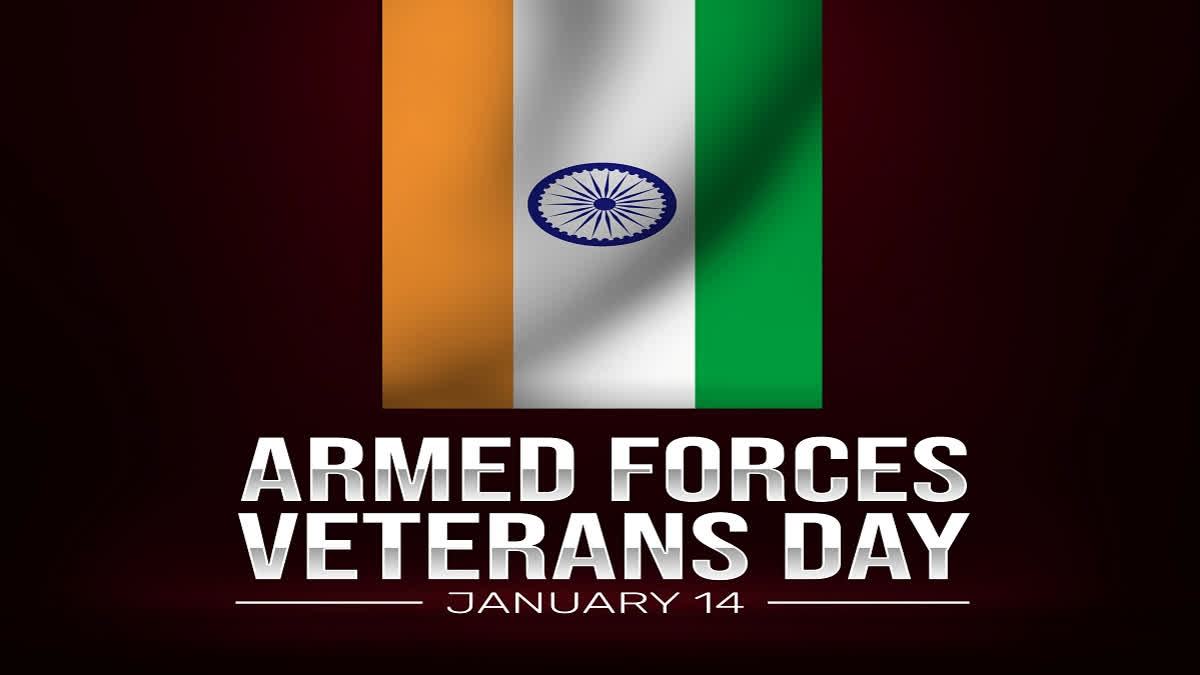Hyderabad:The Armed Forces Veterans Day is observed on January 14. This day is marked since 1953, the first Indian Commander-in-Chief (C-in-C) of Indian Army- Field Marshal KM Cariappa, who led Indian Forces to victory in the 1947 war, had formally retired from the Services. The day is observed to honour the veterans.
The 8th Armed Forces Veterans' Day nationwide celebrations will be spearheaded by Defence Minister Rajnath Singh and will begin with an ex-servicemen rally at Air Force Station, Kanpur. In addition, he will honour the brave heroes for their tremendous sacrifice and unwavering dedication to the country by laying a wreath at the War Memorial.
In 10 different cities around the nation — Srinagar, Pathankot, Delhi, Kanpur, Alwar, Jodhpur, Guwahati, Mumbai, Secunderabad and Kochi — the three Services will commemorating the occasion this year. The function at Secunderabad will be presided over by Minister of State for Defense Ajay Bhatt. The Chief of the Air Staff and Chief of the Naval Staff will be present at the New Delhi event, which is scheduled to take place at the Manekshaw Centre.
Chief Ministers and Lieutenant Governors have been asked to observe Veterans Day in their respective states and Union Territories as part of the celebration's expansion. The veterans will receive awards such as medals, souvenirs, certificates of honour on the occasion. The 'We for Veterans' Anthem, an homage to veterans, will be played as part of the festivities.
Background of Armed Forces Veterans Day- India renamed Armistice Day as Armed Forces Veterans Day in 2017. 2020 saw the National War Memorial host its fourth Armed Forces Veterans Day celebration. Attending the event were the chiefs of the Army, Navy, and Air Force. This day was selected to acknowledge the sacrifices that veterans have made on behalf of the nation and to honour their service in the military forces.
Significance - The Indian Army's first Commander-in-Chief, Field Marshal KM Cariappa, who guided Indian forces to victory in the 1947 war against Pakistan, officially retired from the Army on January 14, 1953. Wreath Laying ceremonies and Veterans' Meets were held in several cities throughout the nation, including Dehradun, Delhi, Jalandhar Chandigarh, Jhunjunu, Panagarh, Mumbai, Chennai, and Kolkata.
The purpose of these events is to honour and strengthen the nation's commitment to the nexts of kin of our brave heroes and to our veterans, in recognition of their selfless service and sacrifices. As a gesture of gratitude for the heroic soldiers' unselfish service, their sacrifices for the country, and our unity with their kin.
Indian veterans- Every year, between 60,000 and 70,000 members of India's armed forces retire or be dismissed, the bulk of these individuals are in their early 40s. Reaching out to the veteran population not only broadens the workforce but also helps fill skill gaps in specific fields. The government declared in September 2015 that it will introduce the new pension program, known as 'One rank One Pension', or OROP, in response to growing dissent and anger among veterans. It provided directives to carry out the plan in February 2016.
With effect from July 1, 2019, the Union Cabinet, led by Prime Minister Narendra Modi, approved the modification of the pension for "armed forces pensioners/family pensioners under OROP." Veterans are disciplined men who have worked in challenging, dangerous, and risky environments before, with the exception of those who were disabled during their military duty. Due to their early retirement ages (32–40) and inadequate pension benefits, the majority of them face unique financial challenges.
Public view of veterans’ concerns- Many members of the literate public, particularly lawmakers, are unaware of the harsh working conditions faced by soldiers, which include early retirement, long separations from family, stressful and potentially fatal situations, high casualty rates, rigorous disciplinary measures mandated by military law, and more.
Veterans’ involvement in aid of civil power - Parliament enacts laws pertaining to the use of the Armed Forces "in aid of the civil power" under Article 246 of the Constitution, outlining the rights, responsibilities, and privileges of troops in such deployments. The AFSP Act (AFSPA) is one such law. This law is used by governments to send the military into its secondary duty for IS tasks, such as CI operations.
National role for veterans - Veterans can influence the general public and, through them, governments can provide better governance within India's constitutional framework if they peacefully engage in national issues and ongoing demands, particularly in the northeastern states of India, Kashmir, and the central Indian states that are increasingly vulnerable to Maoist violence.
